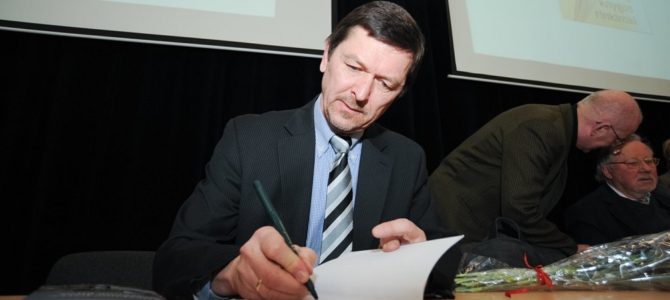 by Vytautas Bruveris
by Vytautas Bruveris
Back to the drawing board: Lithuania again has become the target of a wave of international criticism because of the country’s relationship with the Holocaust. This time, because of the appointment of publicist and public activist Vidmantas Valiušaitis to the leadership of the Center for the Study of the Genocide and Resistance of Residents of Lithuania [Genocide Center].
The country’s Jewish community as well as an influential international organization, the American Jewish Committee (AJC), reacted sharply to this announcement. Leaders at the AJC even called the Lithuanian Government’s actions in the area of Litvak history and Holocaust commemoration hypocritical.
At the same time the Genocide Center is getting an ever darker reputation in the international area, that of an ideological right-wing nationalist bunker rather than an authoritative and academically objective institution.
Fooling Others, or Just Themselves?
Valiušaitis has expressed himself actively in the field of post-war resistance commemoration, but just as much or maybe even more so he has been an active and categorical defender of the post-war partisan as well as the Nazi puppet government structures, the Lithuanian Activist Front and the Lithuanian Provisional Government, denying any connections between them and Nazi ideology, Nazi policies and, of course, the Holocaust.
Recently he has been defending actively Jonas Noreika, or “General Storm,” from any hint of taint, a man who as well as being part of the anti-Soviet resistance was also the head of the Šiauliai district under the Nazi administration and signed orders for establishing Jewish ghettos and seizing Jewish property.
When Genocide Center director Birutė Burauskaitė left that post, there was talk behind the scenes the plan was for Vidmantas Valiušaitis to assume that post.
Although the Center and Burauskaitė in recent times have taken a rather strong “state” and “hard” position, defending Noreika as well as similar characters from some supposedly “Russian-inspired” attack, it seems they wanted to fortify even more the Center’s policies.
Valiušaitis has support in the right-wing opposition, but also among the ruling Peasants’ Party, and it seems he was looked upon favorably by high-ranking officials at other state institutions and in the Government.
But even back then there was dissatisfaction with these plans, mainly from the historians’ community. Despite that, the plan to install Valiušaitis as head of the Genocide Center was rejected for a different reason, namely, it came with the realization of what a negative reaction this could cause at the embassies of the major Western countries–the United States primarily–and among international Jewish organizations.
So they decided to adopt what they thought a clever manouevre: instead of appointing Valiušaitis to head Genocide Center, they would appoint instead a public figure who had almost nothing in common with the field, Adas Jakubauskas, one of the leaders of the Tartar ethnic community in Lithuania.
He was seen as an ideologically neutral figure, although following his appointment he did manage to indicate in several public statements he stood on the same side of the divide as Valiušaitis and company. So here now Jakubauskas appoints Valiušaitis his advisor who will be responsible for Genocide Center PR, but also responsible for research on the Nazi and Soviet occupations.
This immediately brought forth public condemnations by some historians. For instance, noted 20th century Lithuanian history and Soviet occupation and resistance researchers Arūnas Streikus and Nerijus Šepetys said the Genocide Center was being turned openly into a political institution, that Valiušaitis was not a real, objective historian but rather a politically and ideologically driven activist, and that he was and would be the real director and prime mover of the Center, not Jakubauskas.
The Lithuanian Jewish Community was also troubled by his appointment, issuing a statement that this compromised the Genocide Center itself, and calling Valiušaitis a proponent of propagators of anti-Semitism and a distorter of history.
The Lithuanian Jewish Community said Valiušaitis’s position is at odds with research conducted by the international commission of historians appointed by presidential decree which has confirmed the anti-Semitic nature of the Lithuanian Activist Front and the Lithuanian Provisional Government of 1941.
Valiušaitis of course rejects all criticism, claiming he only publishes “facts” which he alleges no one is able to contradict. Patriarch of the Lithuanian Conservative Part Vyatautas Landsbergis himself is among those who have come to Valiušaitis’s defense.
Members of that camp claim the target of this entire “attack” isn’t the Genocide Center itself, but the state of Lithuania and the foundations of her historical identity.
Calling for an End to the Hypocrisy
After that sort of reaction, it was only a matter of time until a public and official reaction arrived at the international level.
Now the AJC has expressed displeasure regarding this event. It says a lot that high-ranking leaders of the AJC have directed their fire not at separate individuals but at the Genocide Center itself and even the current Lithuanian Government.
[Note: the following is a re-translation into English of the reporter’s translation into Lithuanian of statements in English from the AJC. These are not direct quotes; at best, they are paraphrases–translator]
Andrew Baker, the director of international relations at the AJC as well as a representative of the Organization for Security and Cooperation in Europe for battling anti-Semitism, said:
“I do not detract in any way from the Center’s work documenting and researching persecution and suffering during the two Soviet occupations which Lithuanian citizens suffered, including many Lithuanian Jews among them as well. But the Center doesn’t just say little about the history of the Holocaust in Lithuania, it even tries to hide and distort it.
“In 2007 the Center’s leadership spread false information about Yitzhak Arad, who was a young partisan who fled the Vilnius ghetto and who later was the founding director of the Yad Vashem Holocaust Museum in Israel. This led to a baseless investigation by Lithuanian law enforcement and did harm to bilateral relations between Lithuania and Israel.
“Last year when the mayor of Vilnius had a plaque commemorating Jonas Noreika removed, the Genocide Center defended the Nazi collaborator, repeating anti-Semitic propaganda from the Third Reich as if it were the historical truth. This provoked a response even from Lithuania’s official International Commission of historians.
“The Center’s latest move is to appoint Vidmantas Valiušaitis senior advisor. This former publicist and journalist, as the Lithuanian Jewish Community has noted, ‘intentionally distorted facts and spread lies regarding the anti-Semitic activity of the Lithuanian Activist Front and the Lithuanian Provisional Government of 1941.’
The Lithuanian Government [i.e., Lithuania] is a member of the International Holocaust Remembrance Alliance and supported the statement adopted last month ‘condemning all attempts to rehabilitate the reputation of people who were involved in Holocaust crimes.’ Meanwhile, IHRA finances Lithuanian Genocide Center activities, the same Center which is doing what the statement condemned. This hypocrisy must end.”
Andrew Baker was seconded by Sebastian Rejak, a former representative of the Polish Foreign Ministry for liaison with the Jewish Diaspora who is now the director of the AJC’s Central Europe bureau.
[Note: the following quotes from Sebastian Rejak are paraphrases, not actual quotes, see above.–translator]
“More than two decades ago Lithuania courageously began the process of healing and reconciliation regarding its own history. There is no benefit to Lithuania society if this process is halted or, even less, if it regresses.
“Poland had a similar experience and recently examples of heroism, at times imagined, have dominated in the public discourse, while darker passages are ripped from the history books.
“To ‘ease’ this process, even laws were passed, but unsuccessfully. This didn’t serve society and didn’t improve the country’s international reputation,” Rejak said.
He said “sugar-coated and frosted history” never brings real benefit and in fact doesn’t serve any higher purpse, and is just a short-term deception.
Rejak also said the appointment of people such as Valiušaitis to such high posts in institutions such as the Genocide Center needs to be assessed.
“How can a research enterprise financed by the state hope to serve its country by employing a person who is known for Holocaust revisionism? Discovering the historical truth is sometimes a very painful therapy.
“If there is blood on the hands of some of our heroes, we have to find different heroes. This is the burden which a mature society tries to bear. And Lithuania isn’t alone in coming up against this challenge. Many neighboring countries have the exact same choice: pretending everything is fine, or continuing on with treatment, even if healing is difficult,” Rejak said.
Original text in Lithuanian here.


